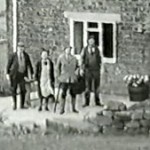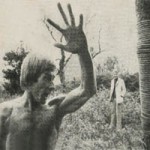Recently-separated thirtysomething metropolitan script editor Norah (Anna Cropper) moves into a remote Vale of Evesham cottage reluctantly inherited from her ex. Various encounters with mysterious locals – Norah’s help, the ruddy, wise Mrs Vigo; toothless simpleton odd-job man peter; sinister, self-taught Fisher and, oddest of all, young Rob, an orphan raised by Mrs V, discovered by Norah practising semi-nude karate in the woods. Lonely and curious, Norah succumbs to the inevitable and invites Rob round for dinner (a roast chicken personally strangled by Mrs Vigo), though his one topic of conversation – uniforms of what he calls the “Woffen” SS – drives her to despair, and after an awkward bit of polite shooing, he leaves.
Outside, however, Fisher, Peter and Mr Wellbeloved the butcher are waiting, and Rob is knocked cold. Inside, Norah is startled out of sleep by a bird which has mysteriously found its way down the chimney. Just in time, Rob bursts in and saves the day. Confused, flustered, Norah succumbs to the inevitable, and they go to bed, despite her Dutch cap having mysteriously gone walkabout earlier that day. Pregnant, but unsure of what to do, she moves into a tiny B&B in London, but Rob tracks her down, naively but threateningly demanding she keep “his” child. Distraught, she returns to the cottage to move her stuff out for good, but her car oddly refuses to start, and she’s told a spare part won’t arrive for a fortnight.
Driven to distraction by the resulting entrapment, she finally confronts Rob in the cottage, and threatens him with a knife. She quickly realises, however, that whatever “plot” she’s unwittingly become a part of, he’s in the same boat. The other locals descend on the cottage, and Norah passes out with shock, while Rob is summarily executed off-screen. The next morning, all is tranquil – the car’s fixed, the formerly hostile Mrs Vigo is all smiles, and a shaken Norah moves out. As she leaves, Fisher puts a calm proposition to her – let Mrs Vigo look after her son-to-be, that he might replace Rob as the mythical Robin Redbreast, to live in the village for twenty years until such time as his blood be used to ensure the continuance of the village harvest, just as young Rob’s has. Norah, shattered, blankly refuses, and drives off, glancing briefly behind her to see Fisher, Vigo and company transformed into mythical figures – Herne the Hunter, Hecate the crone etc. – in one final, eerie shot.
The story, in theme and, for the most part, execution, looks like a genre piece more suited to the later anthology series such as Thriller and Hammer House of Horror. Indeed, it was originally submitted by Bowen to the series department, who rejected it on the grounds that the abortion, contraception and pagan/religious references were too near the knuckle for a generic slot. Fortunately, Play for Today series producer Graeme MacDonald rescued the play from purgatory. While its “British Gothic” suspenseful style and twist ending certainly invite comparisons with the best of Thriller et al – by no means a bad thing – there’s more going on here than a simple horror story. Norah, though far from immediately likeable, is a more strongly-drawn central character than the screaming damsel of popular cliche. She resolutely refuses to be intimidated by the silent menace of the likes of Fisher, which gives the final scenes far more power than had she been a panicky girl from the outset. (It’s notable that only the “innocents” Norah and Rob are prone to any display of physical violence until Rob’s demise.)
Conventions of the suspense genre are played with, even sent up to some extent, but always respected for the tools of craft that they are. Peter the giggling halfwit, the phone cutting out leading to frantic jiggling of the cradle, mysterious figures watching in the distance – all are present and correct. But others are self-consciously examined, often by the combative Norah. Mrs Vigo’s habit of asserting, of a particular trait of a local, that they are “known for it” is spat back mockingly by Norah, as are the Black Country “you’m” grammatical constructions. Norah finds herself, alone and panicking in the cottage, talking to herself, as solitary heroines often do to help move the plot along, and chides herself “stop talking to yourself. You’re making me nervous.” These self-aware tricks help Norah ground herself in reality, while also doing the same for the drama. Elsewhere the locals provide weird comic moments, none better than when a desperate Norah tries to get on the infrequent bus to Worcester, but is conned into standing in the wrong spot by a group of silent middle-aged ladies.
As for that final mythical tableau, it certainly provides an effective punchline for the play (after the relatively low-key denouement with Norah and a calmly sinister Fisher) but it sits oddly with James MacTaggart’s otherwise largely restrained, unfussy direction (the recurring, unexplained motif of a marble cut in half is a much less OTT, and more effective, representation of mysterious menace). Like any good genre director, MacTaggart keeps it simple – aside from one nice, ethereal montage, it’s straightforward (and very accomplished) storytelling all the way, never overdoing the visuals for the sake of supernatural spectacle. In fact, sound becomes far more important than picture in a lot of scenes. The overlaid chopping of Peter’s double-headed axe, nocturnal birdsong, the scrabbling of mice in the walls, and the distant sound of voices blowing in on the wind are expertly co-ordinated to give a sense of off-screen happenings going on “out there” that help root the viewer firmly in Norah’s cottage, apprehensively looking out.
| Screen-grabbery: | ||
 |
 |
 |




















Stephen Campbell
May 31, 2011 at 4:59 pm
They showed a clip of this on BBC4s Welly Telly
It looked pretty good
Come to think of it BBC4 lets have a play for today doc and some of the classics PLEEEASSE
Stephen Campbell
April 23, 2014 at 3:38 pm
Now Available on BFI DVD thanks BFI now do some more including the single Dennis Potter plays